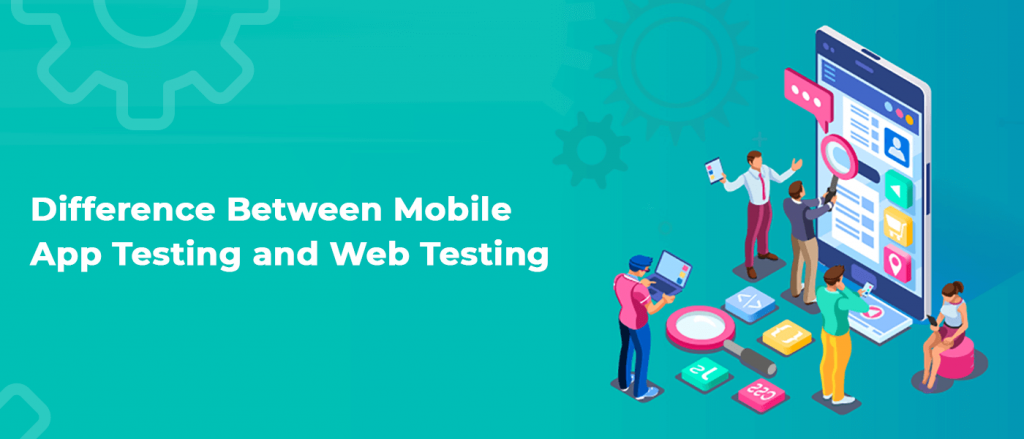Testing for Website and Mobile applications: Today’s even-changing and competitive world, the internet has become an integral part of our lives, Mobile technology and smart devices are all trending now and it will be change in future of the world as we know it, hence hosting a website is no longer or optional but mandatory for all kind of business.
The most important point of this article is web and mobile app solutions which we deliver to our clients without any bugs are in the applications.
Table of content
- What is software testing and its types?
- How to test an application and its plan?
- Benefits of software testing
- Why we need test for web-application
- Why we need for mobile app
- Conclusion
What is Software Testing?
Software testing is method to check whether the actual products matches the expected requirements of the product and to ensure that the product was defects free or not. It having a two methods like manual and automation tools to evaluate one or more properties of interest.
Otherwise known as it helps to identify the defects to provide a quality product to a customer or end user/client.
Types of Software Testing
Some of the testing types are,
Manual Testing: Testing conducted by a human.
Automation Testing: Testing conducted by using a automation tools like selenium webDriver tool.
Functional Testing: Functional testing is a type of software testing is a process of functionality of a software system .It means each of the application’s business requirement description is authenticate in this type of testing by passing the test data and comparing the actual result with the expected result.It is basically defined as to test the functionality of the software application.
Non- Functional Testing: This testing is a type of software testing and to check whether non-functional feature like Performance, Usability, and Reliability etc…in a software application.
Static Testing: It means verification of the software application. To identifying the defects in process of the application.
Dynamic Testing: It means validation of the application. Is to executing and using the software system.
Unit Testing: Unit testing is nothing but the code of individual module is working fine or not. It conducted by a developer.
Integration Testing: The programmer will combine all modules together and will check the interaction between these module, it means communicate between the modules is called integration testing.
System Testing: It is nothing but validating both functionality and non-functionality of the application.
User Acceptance Testing (UAT): They will check the product is good for live or not.
Security Testing: It is unveils the vulnerabilities of the system to ensure that the software system and app are free from any threats or risks.
Regression Testing: It is performed to determine if the code modifications break an application or consume resources.
And other types are performance testing, usability testing, scalability testing, penetration testing, volume testing, endurance testing, compatibility testing, stability testing, exploratory testing, cross browser testing, accessibility testing, ad hoc testing etc.
Read more: Types of Software Testing in Software Field
How to test an application?
- To create a test plan according to the software application requirement
- To develop a manual test case scenarios from the end users/clients outlook
- If using automation tools for that application the test scenarios using the test scripts
- Finally do perform the functional tests and validate if everything works according to user requirements
What is a test plan?
A test plan documents that what, when, why, how and who of a testing the project. A test plan is a document that outlines the designing for test process. It restrain guidelines for the testing process such as approach, testing task, environment needs, resource requirement, schedule and constraints.
A good test plan covers all the testing modules in Software Development Life Cycle (SDLC).
IEEE standard for test plan
- Test plan identifier
- Introduction
- Test items
- Features to be tested
- Features not to tested
- Approach
- Item pass/fail criteria
- Suspension criteria and resumption requirements
- Test deliverables
- Testing task
- Environmental needs and so on
Benefits of software testing
- Testing is helps to saving money
- Security of the application
- Qualify of the software product
- Customer/client satisfaction
- Upgrade the development process
- While adding a new features was easy
- It supports for multiple platforms
- Higher test coverage
- Save time and fast release
Why we need test for web application
A web application is an app that is accessible online and can be used on multiple devices. And it also defined as web application is a software testing exercise to test websites or web applications for potential bugs. It’s a complete testing of web based application before producing them live is known as web application testing.

A web based system needs to be research from end to end before it goes live for end users by performing website testing, an organization can make sure that the web based system is functioning rightly and can be confirmed by real time users.
Types of web application testing
- Functionality testing
- Usability testing
- Interface testing
- Compatibility testing
- Performance testing
- Security testing
Recommended tools
- Cross browser testing
- Cloud based real device
- Load ninja
- LambdaTest
What is Api Testing?
The abbreviation for API is “Application Programming Language” is a set of subroutine definitions, communication protocols and tools that allows two software programs to communicate with each other.
Why use Api in testing?
- Effortless Integration
- Mobile Application
- Cloud Integration
- Flexibility
- Competitive Market
- Proven Success
Why we need test for mobile app
Mobile app testing is a process of running test against a mobile application to make sure that the application is ready for launch. The aim of this application testing to identify any bugs for the hybrid mobile app across a world range of android and ios devices.

As the term suggests, mobile app testing refers to the process of validating a mobile app for its functionality and usability before it is released publicly. Testing mobile apps help verify whether the app meets the expected technical and business requirement.
Purpose of mobile app testing
Mobile application testing enables enterprises to build application that are scalable and accessible across multiple platform. It’s a process to build an application software by testing it for its functionality usability and consistency this can be done by automation as well manual testing.
Apps usually store their data locally on mobile devices unlike website that generally are web server. Apps can further save uses time by storing their preference and taking proactive actions.
What are the elements to be observed for mobile app testing?
- Stable network bandwidth and carrier network.
- Great user experience
- Impressive end-to-end security
- Stale across operating system
- Delight with usability
- Compatible across devices
- Uniform scalability
Types of mobile application testing
- Functional testing
- Interruption testing
- Localization testing
- Speed testing
- Memory leak testing
- Usability testing
- Performance testing
- Security testing
Mobile application testing tools
- Test IO
- Appium
- Robotium
- Xamarin UI test
- Espresso
- XCUI Test
- Ranurex Studio
Appium is one of the most popular open-source test automation tool in mobile application testing.
Difference between the web and mobile application testing

| Mobile Application Testing | Web Application Testing |
| In mobile application the software programs that are used on mobile devices. | In web application the software programs that are used on computer. |
| It was developed for broader range of users. | Web application are developed for shorter range of users as compared to mobile application |
| This application are download from Google playstore. | Application will be updated on website |
| It is not easy for create responsive design for small screen devices. Ex mobile tablets | It is easy to code relative design for large screen devices. Ex: desktop, laptop |
| Mobile storage capacity is limited | Storage capacity of this application devices are unlimited |
| It is quit complex and complicated to test mobile apps because of different mobile devices and greater number of functionality. | It is easy and simple test web application because of functionality of desktop. |
| To check the performance of the mobile device on fully charged or low battery devices. | In web application battery life problem is no. |
Conclusion:-
The main goal of the software testing for both website and mobile app testing is to ensure its usability and proper functioning under different circumstances. Test automation tools reduce and optimize your testing efforts while making the entire quality assurance process through and budget-friendly.
Software testing is an dominant part of the software development life cycle. It is not a single activity that takes place after code implementation by developer then move to tester .A successful test strategy will begin with consideration during requirements specification.
So the main reason for the web and mobile app testing is the application to deliver the client without any bugs.
